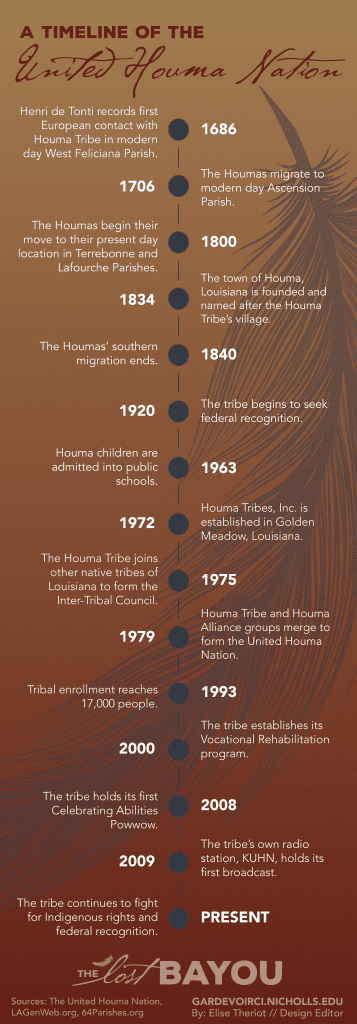By Jade Williams & Addie Wetzel, Features Editor & Managing Editor
Before gumbo, Zydeco and the multicultural influences that shaped today’s modern South Louisiana culture, the people of the United Houma Nation inhabited this land and nearby regions. One of the many native peoples, their rich culture influenced many aspects of the bayou region today.
Migration
Originally from Mississippi, the tribe were mound builders that go back thousands of years. Over time, war, colonization and prejudice pushed the tribe into Louisiana and eventually to the Louisiana coast.
“We were identified in Mississippi by the Spanish in the 1540s, but we migrated. We spread out,” says Kathleen Bergeron, a tribal elder from St. Mary Parish. “When the French arrived, we were north of Baton Rouge. Matter of fact, Southern (University) campus is our ancestral land.”
Melanie Hayes, an archivist for the tribe, says they eventually settled in areas of swamp and marsh in Louisiana spanning six parishes — St. Mary, Terrebonne, Lafourche, Jefferson, Plaquemines and St. Bernard. And, unlike some other Native American tribes, the Houma has never had a reservation or protected lands.
Losing Land
The six parishes where most of the 19,000-member tribe now lives line the Gulf of Mexico and, with that, are threatened by hurricanes, rising sea levels, coastal erosion and other environmental risks created by companies like oil and gas. Their land is disappearing.
“The land that we used to meet on… it’s just gone,” Hayes says.
Bergeron says her family always fished and trapped, but the areas are now lost.
“The places that my grandparents and my parents trapped are pretty much gone,” says Bergeron. “You see where they used to have the docks, it’s all water now. Used to be where they put their camps to trap, it’s gone.”
Losing Culture
The culture and community of the United Houma Nation faces more than just the loss of their land. The tribe’s culture is also being threatened as the older generations pass away. Things like language, arts and crafts and the ways of healers called traiteurs are being lost, says Hayes.
“This period is very threatening because of technology, social media and our kids are getting to go to main schools,” Bergeron says.
Hayes agrees. “Language is being butchered by social media,” she says.
Yet even with the current threats, the tribe’s past shows they can overcome, Bergeron says.
“We don’t give up. We are not giving up who we are.”

